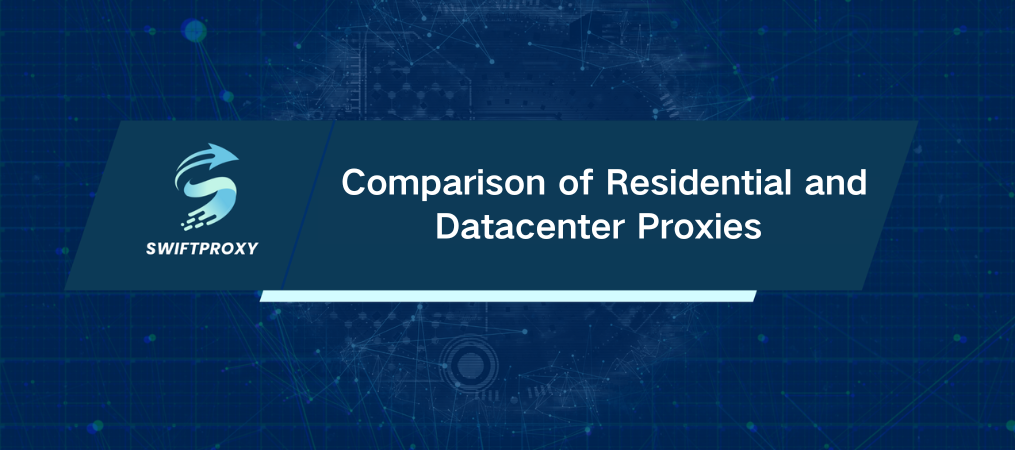Comparison of Residential and Datacenter Proxies

In simple terms, proxy servers have the potential to redefine your understanding of what the internet can offer. Datacenter and residential proxies can protect your IP address, maintaining your online privacy, but they can do much more than just that.
In practical use, proxy servers act as gateways to accessing the entire internet, helping you bypass geographical restrictions to access websites located in other countries and regions.
For those who are deciding between datacenter and residential proxies, there are several factors to consider comprehensively. In this article, we will discuss the differences between these two types of proxies and their respective uses.
Introduction to Datacenter and Residential Proxies
Proxies ensure the anonymity and security of your online activity, personal information, IP address, browsing history, and other data. They bypass digital barriers, evade geographical and website restrictions, and enhance your safety. Both datacenter proxies and residential proxies operate similarly in this regard, by masking your IP address to provide security and anonymity. These are two essential types of proxies with distinct characteristics. Let's explore their differences in detail.
Concept of Datacenter Proxies
Datacenter proxies are widely used today. They operate independently of your internet connection and service provider.
Typically purchased in bulk from third-party sources, datacenter proxies provide a range of IP addresses for your use. When utilizing these proxies, your original IP address is hidden and substituted with an IP address provided by the datacenter proxy service provider.
Each proxy is assigned a unique IP address, offering you a distinct online identity each time you connect to the internet. Datacenter proxies enable you to select your virtual location by providing various IP addresses, allowing you to appear as if you are browsing from different places around the globe. This feature empowers you to access the internet from any location worldwide.
However, these proxies are commonly obtained from cloud service providers and are frequently utilized by multiple users concurrently. Since datacenter proxy IP addresses are not tied to internet service providers (ISPs), they often face a higher risk of being flagged and banned.
Concept of Residential Proxy
When your internet service provider sets up your home or office for internet access, they assign an IP address specific to that location. This residential IP address corresponds to the physical site from which you access the internet. If you relocate to a different physical location, your internet service provider will assign you a new IP address for that new location.
Residential proxies are IP addresses provided by internet service providers (ISPs). They are genuine IP addresses assigned to real devices connected through residential internet connections. Using a residential proxy allows you to browse the internet using the IP address of an existing home or office.
Unlike datacenter proxies, residential proxies can be traced back to their actual physical location by websites and services. This means residential proxies closely resemble real internet users, offering a higher level of authenticity and trustworthiness in online interactions.
What Distinguishes Datacenter Proxies from Residential Proxies?
When deciding between a datacenter and residential proxy, your choice hinges on your specific requirements. Datacenter proxies are more widely available and easier to locate compared to residential proxies. They are generally more cost-effective, with some proxy service providers charging less than a dollar per IP address. A significant advantage of datacenter proxies is their speed, as they are not restricted by ISP limitations, offering enhanced performance for various online activities.
Residential proxies generally have slower speeds because their performance is tied to the internet connection speed of the physical IP location they represent. However, due to their association with an ISP and a genuine internet connection, residential proxies excel in bypassing geo-blocking. With the widespread availability of the internet across the globe, residential proxies offer access to a vast range of IP locations worldwide.
If trustworthiness and legitimacy are your priorities, residential proxies are the optimal choice. Websites place higher trust in these proxies because their IP addresses are associated with genuine residential locations or recognized ISPs. Some websites can identify proxy connections by verifying if they connect to physical addresses or legitimate ISPs.
In contrast, datacenter proxies often appear in blocks with sequential IP addresses. These proxies lack affiliation with specific locations or legitimate ISPs, making them straightforward to identify and block.
Residential proxies experience much lower block rates compared to datacenter proxies. Due to their use of genuine IP addresses from real residential locations, they are highly effective as social media marketing tools. Platforms like Instagram and TikTok, for instance, can easily detect and block datacenter proxies, whereas residential proxies are less frequently detected.
When deciding between datacenter and residential proxies, keep in mind that both provide anonymity by masking your IP address. Residential proxies offer higher security and are less likely to be detected, but they tend to be slower and more costly. Datacenter proxies, on the other hand, are faster, more affordable, and widely available, but they are also easier to detect and block.
Final Thought
Once you've decided, it's crucial to choose a reputable proxy service provider. A trustworthy provider will ensure their proxies are clean, free from blacklisting, bans, or suspicious activity.
At Swiftproxy, we provide an exceptional solution. Our static and rotating residential proxy service grants you exclusive ownership of genuine IPs from various countries worldwide. We do not share proxies; each one is dedicated solely for your private use.
In addition, we offer options for automated proxy rotation and switching for our clients. Our data center proxies perform exceptionally well with fast speeds and robust security. Our residential proxies provide proxy assistance for social media marketing, fully meeting your promotional needs. Finally, our advanced private proxies offer a selection of IPs from multiple subnetworks and support both HTTPS and SOCKS5 protocols.
Reach out to us today to explore how we can support your business!

















































